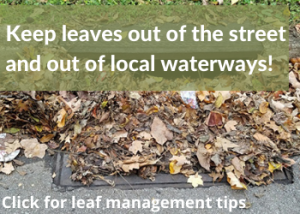Keep fall leaves and other yard waste out of the street!
Fall brings cooler temperatures and changing colors on our trees which can result in raking. While raking leaves isn’t rocket science, some leaf-raking practices can be harmful. Raking leaves into the street clogs storm drains, causing street flooding; if they don’t clog but rather wash down into the storm drains they become a storm water pollutant. The additional nutrients from the massive amounts of leaves decomposing in creeks, streams, or lakes removes oxygen from the water, suffocating plants and wildlife, and causing algae blooms that can result in bad odors and unpleasant tastes in drinking water.
The Ecology Action Center urges residents to help keep our local waters clean by using the following leaf management practices:
- Let leaves lie! Leaving your leaves where they fall is zero effort and beneficial for your lawn.
Many residents dislike the look of fallen leaves and thus choose to use a mower to break them
into smaller pieces as you get some of the same benefit with less visual mess. Leaves make
great mulch to protect flower beds from harsh winter weather and also allow earthworms and
other microorganisms to decompose the leaves and turn them into plant-usable organic matter. - Compost your leaves! Leaves are a great source of carbon and an important dry component to
a healthy compost pile. Starting a compost pile reduces your waste, keeps waterways clean, and
is an easy generator of free fertilizer for your lawn and garden. Find helpful instructions to start
your compost pile at CompostBN.org. - Don’t break the cycle! The above two options keep your organic material on-site, rejuvenating
your soil with valuable nutrients just like the nutrient cycle occurring in nature. Removing your
leaves each year can gradually deplete your soil, leaving your lawn, your trees, and your garden
hungry for nutrients. Keeping these materials on-site also helps reduce demand for collection,
conserving financial resources for other municipal services. - Curb your leaves! If you rake your leaves for curbside pick up, the municipalities require that you
rake them to the curb, but NOT into the street.
For more information on leaf collection in Normal
For more information on leaf collection in Bloomington




